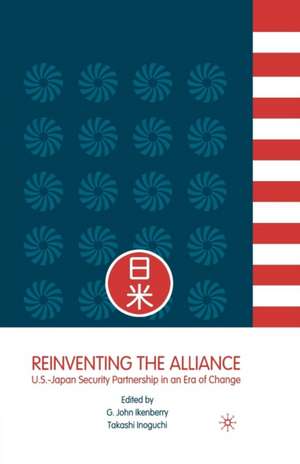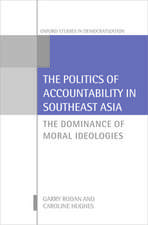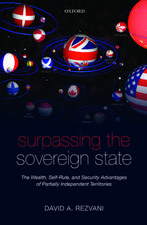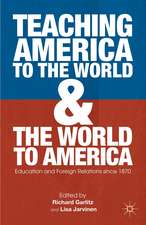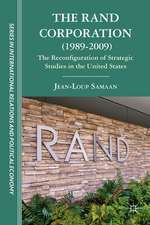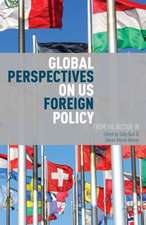Reinventing the Alliance: US - Japan Security Partnership in an Era of Change
Editat de G. Ikenberry, T. Inoguchien Limba Engleză Paperback – 20 ian 2004
| Toate formatele și edițiile | Preț | Express |
|---|---|---|
| Paperback (1) | 384.48 lei 6-8 săpt. | |
| Palgrave Macmillan US – 20 ian 2004 | 384.48 lei 6-8 săpt. | |
| Hardback (1) | 388.52 lei 6-8 săpt. | |
| Palgrave Macmillan US – 20 ian 2004 | 388.52 lei 6-8 săpt. |
Preț: 384.48 lei
Nou
Puncte Express: 577
Preț estimativ în valută:
73.58€ • 79.90$ • 61.81£
73.58€ • 79.90$ • 61.81£
Carte tipărită la comandă
Livrare economică 22 aprilie-06 mai
Preluare comenzi: 021 569.72.76
Specificații
ISBN-13: 9781349527335
ISBN-10: 1349527335
Pagini: 266
Ilustrații: XIII, 266 p.
Dimensiuni: 140 x 216 x 15 mm
Greutate: 0.33 kg
Ediția:Softcover reprint of the original 1st ed. 2003
Editura: Palgrave Macmillan US
Colecția Palgrave Macmillan
Locul publicării:New York, United States
ISBN-10: 1349527335
Pagini: 266
Ilustrații: XIII, 266 p.
Dimensiuni: 140 x 216 x 15 mm
Greutate: 0.33 kg
Ediția:Softcover reprint of the original 1st ed. 2003
Editura: Palgrave Macmillan US
Colecția Palgrave Macmillan
Locul publicării:New York, United States
Cuprins
Introduction; G.J.Ikenberry & T.Inoguchi SECTION ONE: HISTORICAL AND REGIONAL SETTING Models of Regional Security Order and the US-Japan Alliance; M.Mastanduno From Balancing to Networking: Models of Regional Security in Asia; J.Tsuchiyama Historical Legacies; T.Berger SECTION TWO: SECURITY BILATERALISM AND MULTILATERALISM Alliance Reform and Regional Reactions; M.Kamiya The US-Japan Alliance and Regional Security Institutions; S.Smith Multilateral Security in Asia and the US-Japan Alliance; V.Cha SECTION THREE: NEW DIMENSIONS TO ALLIANCE COOPERATION The 'Revolution in Military Affairs' and Security in Asia; M.O'Hanlon Ballistic Missile Defense and the US-Japan Alliance; U.Tetsuya The Evolution of United Nations Peace Operations and the US-Japan Alliance; S.Stedman UN-PKO; A.Fukushima
Recenzii
The fifty-year old U.S.-Japan alliance demands serious reexamination. The end of the Cold War, the rapid expansion of China and the outbreak of Islamist terror networks have undercut key security premises on which the alliance was forged. Yet these changes make a healthy U.Ss-Japan relationship even more critical to regional stability than before. Ikenberry and Inoguchi lead an impressive array of experts in an ambitious effort to diagnose the alliance in its bilateral and multilateral contexts. The book offers a rich and textured analysis of the present day alliance and an invigorating new mapping of potential fruitful directions. - T.J. Pempel, Director, Institute of East Asian Studies, University of California, Berkeley
This book reassesses the fifty-year old U.S.-Japan alliance and explores the ways in which this security system could be effective for the next fifty years. In the search for a viable redefinition of the U.S.-Japan alliance in the future, the authors study different models of regional security, and propose that the "U.S.-German relationship model" is a better model for the U.S.-Japan security partnership than the "U.S.-British partnership model," recommended in the Armitage Report (fall 2000). Altogether, this work provides valuable insight for redefining the role of the U.S.-Japan alliance in Asia in the twenty-first century. - Mayumi Itoh, University of Nevada, Las Vegas
The contributors in this volume are well-chosen. Ikenberry and Inoguchi skillfully introduce the reader to the themes of the book. Well-organized scholarship flows deftly to guide both the non-specialist as well as the specialist reader through the wealth of expert information presented on this complex topic.
- Robert Angel, Associate Professor, Department of Political Science, University of Southern California, and author of Explaining Economic Policy Failure: Japan and the 1969-1971 International Monetary Crisis
This book reassesses the fifty-year old U.S.-Japan alliance and explores the ways in which this security system could be effective for the next fifty years. In the search for a viable redefinition of the U.S.-Japan alliance in the future, the authors study different models of regional security, and propose that the "U.S.-German relationship model" is a better model for the U.S.-Japan security partnership than the "U.S.-British partnership model," recommended in the Armitage Report (fall 2000). Altogether, this work provides valuable insight for redefining the role of the U.S.-Japan alliance in Asia in the twenty-first century. - Mayumi Itoh, University of Nevada, Las Vegas
The contributors in this volume are well-chosen. Ikenberry and Inoguchi skillfully introduce the reader to the themes of the book. Well-organized scholarship flows deftly to guide both the non-specialist as well as the specialist reader through the wealth of expert information presented on this complex topic.
- Robert Angel, Associate Professor, Department of Political Science, University of Southern California, and author of Explaining Economic Policy Failure: Japan and the 1969-1971 International Monetary Crisis
Notă biografică
THOMAS BERGER Associate Professor in the Department of International Relations at Boston University, USAVICTOR CHA Associate Professor of Government and D.S. Song - Korea Chair in Korean Studies in the Edmund Walsh School of Foreign Service at Georgetown University, USAAKIKO FUKUSHIMA Director of Policy Studies and Senior Fellow of the National Institute of Research Advancement, Tokyo, JapanG. JOHN IKENBERRY Peter F. Krogh Professor of Geopolitics and Global Justice at Georgetown University, USATAKASHI INOGUCHI Former Assistant Secretary General of the United Nations, Professor of Political Science at the Institute of Oriental Culture, University of Tokyo, JapanMATAKE KAMIYA Associate Professor of International Relations at the National Defense Academy of JapanMICHAEL MASTANDUNO Nelson A. Rockefeller Professor of Government at Dartmouth College, New Hampshire, USAMICHAEL O'HANLON Senior Fellow at the Brookings Institution, Washington DC, USASTEPHEN JOHN STEDMAN Senior Fellow and Acting Co-Director of the Center for International Security and Cooperation at Stanford University, USAUMEMOTO TETSUYA Professor of International Relations at Shizuoka Kenritsu University, JapanJITSUO TSUCHIYAMA Professor of International Relations at Aoyama Gakuin University, Tokyo, Japan
